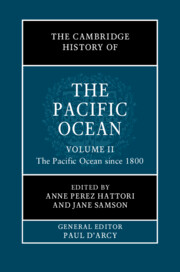Book contents
- The Cambridge History of the Pacific Ocean
- The Cambridge History of the Pacific Ocean
- The Cambridge History of the Pacific Ocean
- Copyright page
- Contents
- Figures
- Tables
- Contributors to Volume II
- Frontispiece
- General Editor’s Introduction
- Preface to Volume II
- Part VII Rethinking the Pacific
- Part VIII Approaches, Sources, and Subaltern Histories of the Modern Pacific
- Part IX Culture Contact and the Impact of Pre-colonial European Influences
- 44 The Pacific in the Age of Revolutions
- 45 Disease in Pacific History
- 46 The Culture Concept and Christian Missions in the Pacific
- 47 Trading Nature in the Pacific
- 48 Seaborne Ethnography to the Science of Race, 1521–1850
- Part X The Colonial Era in the Pacific
- Part XI The Pacific Century?
- Part XII Pacific Futures
- References to Volume II
- Index
46 - The Culture Concept and Christian Missions in the Pacific
from Part IX - Culture Contact and the Impact of Pre-colonial European Influences
Published online by Cambridge University Press: 11 November 2022
- The Cambridge History of the Pacific Ocean
- The Cambridge History of the Pacific Ocean
- The Cambridge History of the Pacific Ocean
- Copyright page
- Contents
- Figures
- Tables
- Contributors to Volume II
- Frontispiece
- General Editor’s Introduction
- Preface to Volume II
- Part VII Rethinking the Pacific
- Part VIII Approaches, Sources, and Subaltern Histories of the Modern Pacific
- Part IX Culture Contact and the Impact of Pre-colonial European Influences
- 44 The Pacific in the Age of Revolutions
- 45 Disease in Pacific History
- 46 The Culture Concept and Christian Missions in the Pacific
- 47 Trading Nature in the Pacific
- 48 Seaborne Ethnography to the Science of Race, 1521–1850
- Part X The Colonial Era in the Pacific
- Part XI The Pacific Century?
- Part XII Pacific Futures
- References to Volume II
- Index
Summary
From the Spanish Jesuits, who arrived first on the island of Guam in 1688 then spread the gospel through the Marianas,1 to the stream of missions, both Protestant and Catholic, which swept through Oceania in the following centuries, European missionaries struggled to understand and describe the lives of the people they encountered. From high islands and coral atolls priests and reverends reported back to Europe on the polity, the religion, or the kinship of the peoples with whom they worked, using terms such as ‘tradition’, ‘custom’, or ‘practice’ or their Spanish, French, or German equivalent, often prefaced with ‘primitive’ or ‘savage’.2 Except for German missionaries, the word they did not use – up until the twentieth century – was ‘culture’. For English-speaking missionaries, at least, ‘culture’ referred to refinement and the attainment of civilization. It was reserved for the higher classes and almost exclusively to Europeans. Yet, in a remarkable shift for a single word, ‘culture’ – led by the new discipline of anthropology – largely lost its older meaning, to emerge in the twentieth century as a new conceptual tool for the understanding and describing of human difference. As professional anthropologists arrived in Oceania they honed the culture concept to insist on the plurality of cultures and to defend Islander traditions and customs. Many did their research with the assistance of in situ missionaries, who were eager to engage in the new disciplines. Most anthropologists, however, viewed mission as the enemy of ‘culture’, yet from the 1930s many missionaries trained in anthropology and the culture concept was picked up by theology.
- Type
- Chapter
- Information
- The Cambridge History of the Pacific Ocean , pp. 349 - 368Publisher: Cambridge University PressPrint publication year: 2023



